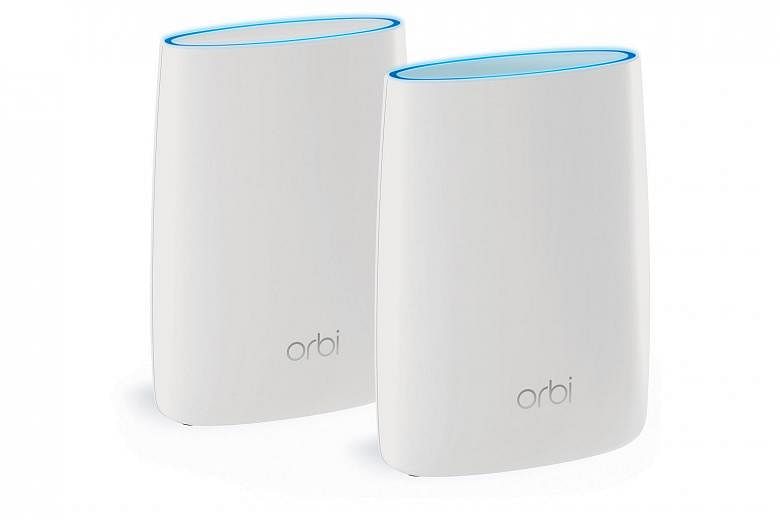With most of us staying in apartments, you'd think that Wi-Fi dead zones, where the Wi-Fi reception is poor or absent, should not occur.
But they do. Having experienced poor Wi-Fi signals first-hand, I have tried various solutions, from tapping the home's electrical wiring for networking to improving the Wi-Fi coverage with a range extender.
They all work, to a certain extent. For instance, range extenders usually create a second Wi-Fi network, requiring users to log in to this network. However, when the signal strength of one network is weak, the client device usually does not know how to switch to the stronger of the two Wi-Fi networks.
The good news is that a new breed of home networking products, dubbed Wi-Fi systems, promise to improve Wi-Fi coverage without requiring extra cabling or user management.
These Wi-Fi systems consist of a router and one or more satellites. Each satellite acts as a node to relay data. Add more satellites to extend the network's reach.
Together, they form a mesh to blanket the home in Wi-Fi. Hence, they are also described as home- mesh Wi-Fi systems.
-
TECH SPECS
PRICE: $649 (1 Orbi router and 1 Orbi satellite)
ETHERNET INTERFACE: 1 x 10/100/1,000 Gigabit WAN, 3 x 10/100/1,000 Gigabit LAN (for router), 4 x 10/100/1,000 Gigabit LAN (for satellite)
STANDARDS: 802.11a/b/g/n/ac
SECURITY: WPA/WPA2, WEP
RATING
FEATURES: 4/5
DESIGN: 4/5
PERFORMANCE: 4/5
VALUE FOR MONEY: 3/5
OVERALL: 4/5
Singtel has been offering a similar Wi-Fi Mesh bundle for a while now. The difference is that Singtel rents you the Wi-Fi system - $10 per month for a pack of two pre-paired units.
But if you wish to buy a Wi-Fi system, the only off-the-shelf solution in the market is the recently launched Netgear Orbi.
The standard kit ($649) comes with a router and a satellite. Roughly the size of a large hardcover book, the Orbi units have a soft-touch white finish that picks up stains easily.
With its antennas hidden, the Orbi does not look like a router. At the top of each unit is a ring LED with multiple colours that indicate the status of the connection.
A solid blue LED represents a good connection between the satellite and the router. A solid magenta means you should place the satellite closer to the router.
You should be able to get the Orbi up and running, including changing the default Wi-Fi passwords via its browser-based user interface, in under 15 minutes.
I did encounter a minor bug while attempting an online update of the Orbi's firmware, but a manual update fixed it.
For a product that seems to target the mainstream user, I was pleasantly surprised that the Orbi has some features that are usually found in advanced routers, such as static routing, Dynamic DNS and port forwarding. But strangely enough, the guest network feature is omitted.
I was not a fan of the Netgear Genie app (for iOS and Android). This clunky-looking app lets you toggle some of the Orbi's features with your phone, but it could do with a facelift.
Netgear says that the Orbi is a tri-band Wi-Fi system. While technically accurate, users can only use two wireless bands, a 5GHz band (up to 866Mbps) and a 2.4GHz band (up to 400Mbps). The third wireless band is reserved for use by the router and the satellite to improve the connection speeds.
Having tried it for a couple of days, I can say with some confidence that the Netgear Orbi has definitely improved my home's Wi-Fi coverage.
My bedrooms, which had a signal strength ranging from 31 per cent to 68 per cent with my previous router, saw an improvement to over 80 per cent signal strength with the Orbi. More importantly, the Wi-Fi signal did not fluctate, resulting in consistent download speeds in my testing.
However, the top download speed I managed with the Orbi (382Mbps) was not as good as the speeds achieved by a high-end router like the Linksys EA9500 (686Mbps).
•Verdict: At $649, the Orbi standard kit is more expensive than buying a router and a range extender. But the convenience and Wi-Fi coverage of the Orbi is probably worth the cost.


